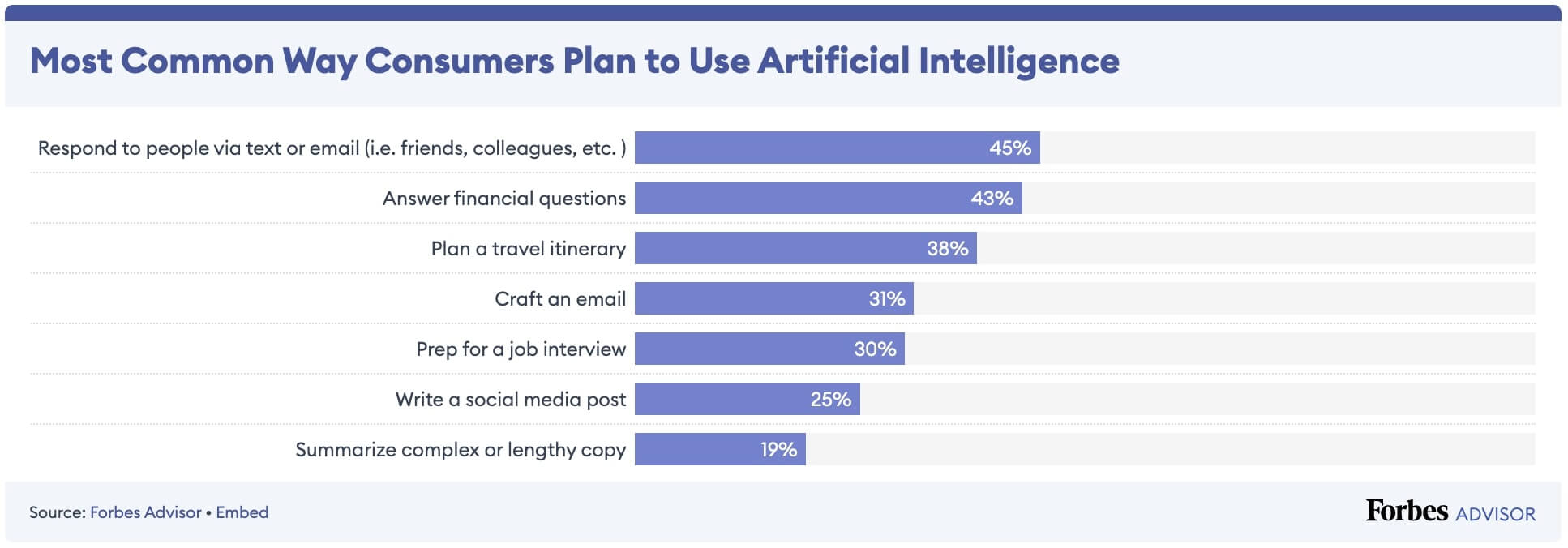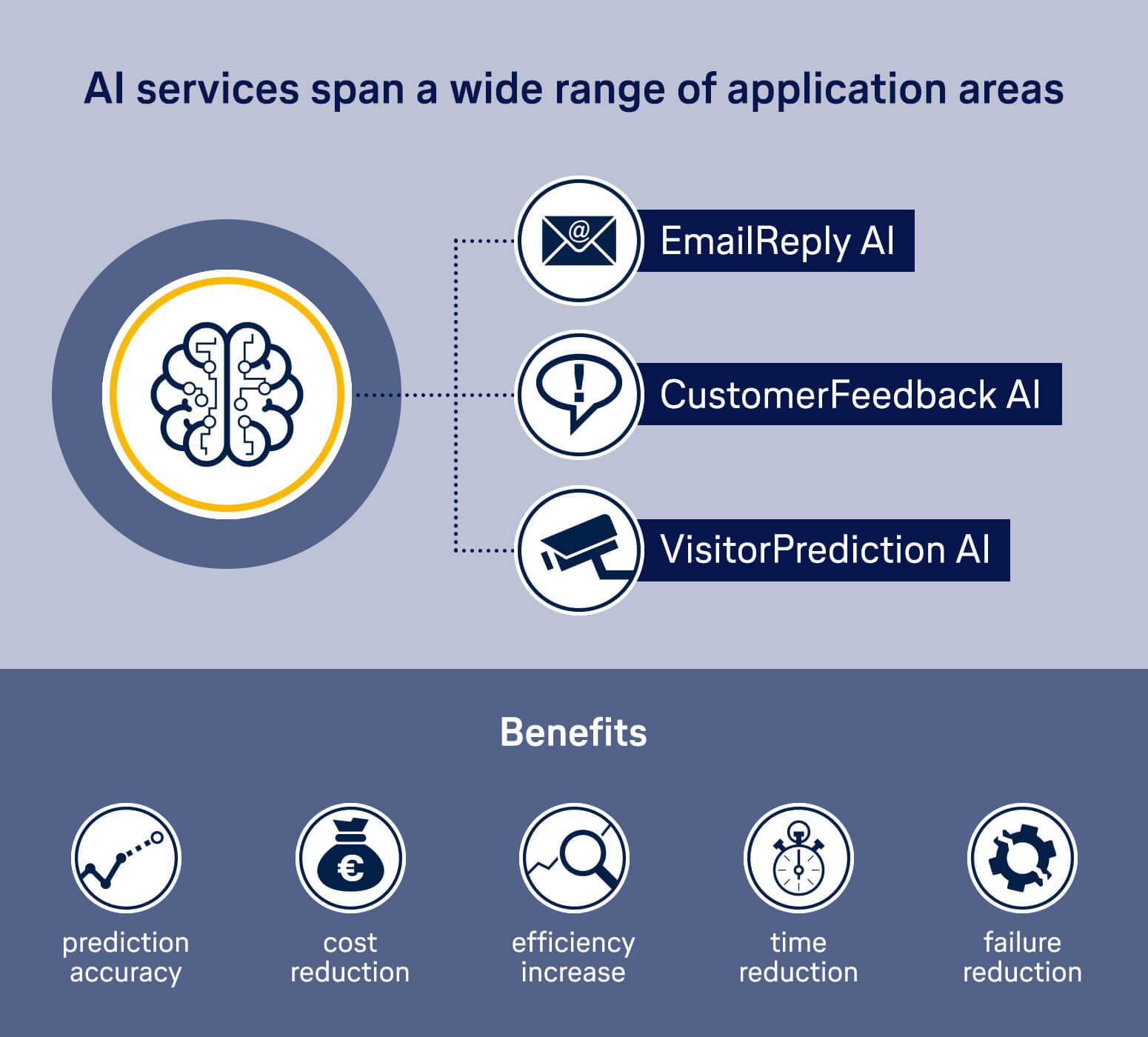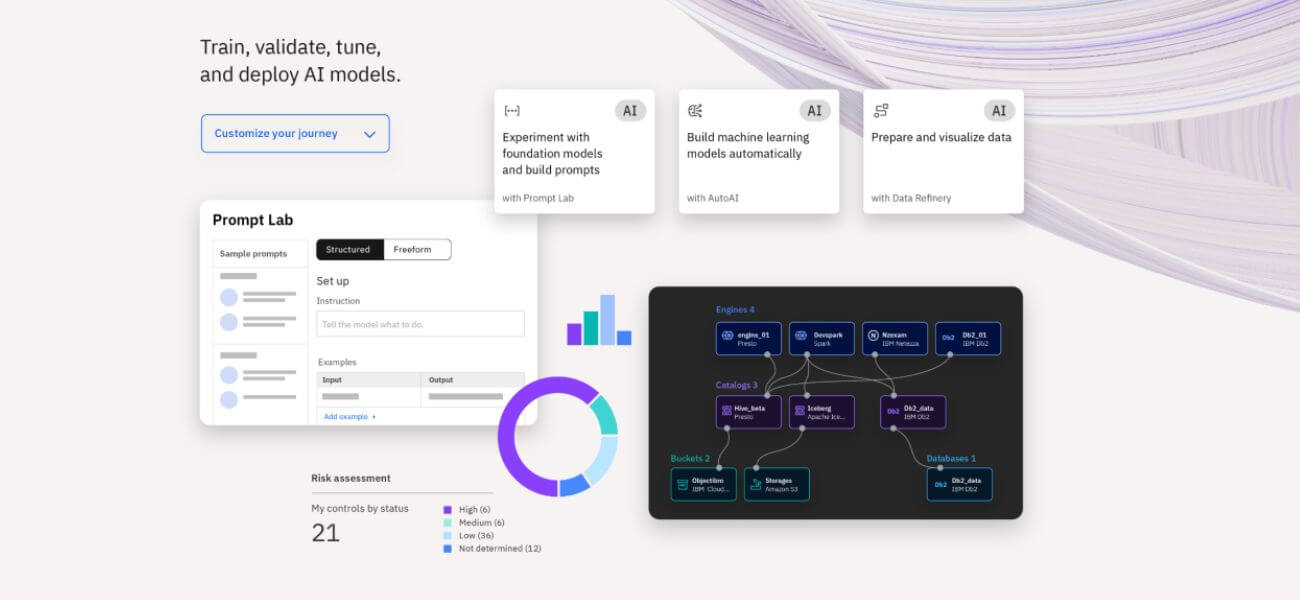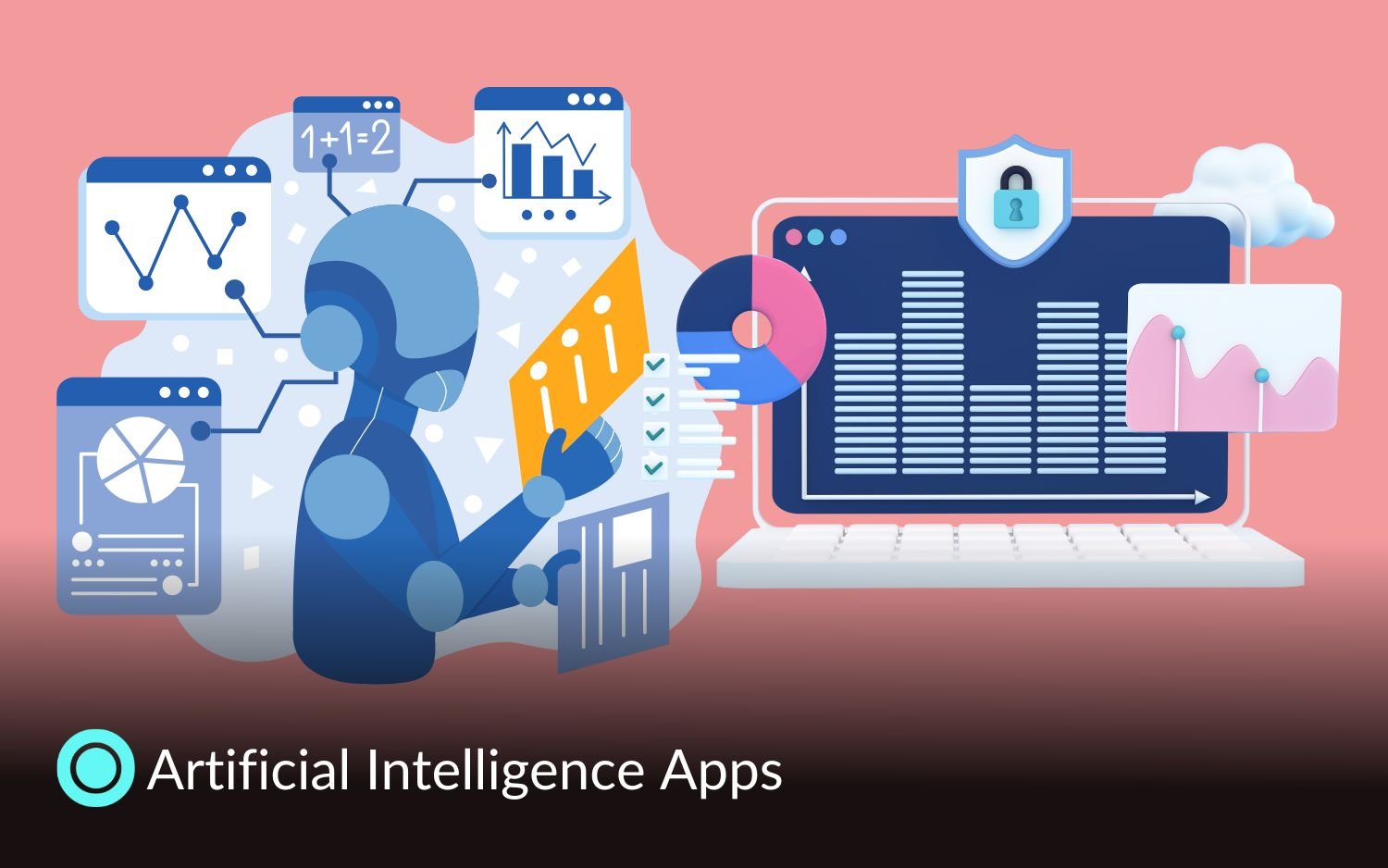Key Takeaways;
- With the development of technology, intelligent applications are becoming more advanced every day, introducing new features that make our lives easier.
- If we look at the journey so far, applications that improve user experience have succeeded, while those failing to meet user expectations have not. This has been the case until now, but what about today? What's the new challenge for applications intelligence?
- With the introduction of Artificial Intelligence into our lives, there's been a surge in innovations in the smart application field aimed at meeting user needs, saving time, and making life easier.
- How will these AI-supported innovations change how we interact with technology? What happens when artificial intelligence, machine learning, and data analysis come together?
The Growing Demand for Application Intelligence Platform
As businesses or consumers seek more personalized and life-simplifying digital experiences, the demand for smart applications continues to rise, making them essential tools for staying competitive in a data-driven world.
What's crucial about the next generation of applications? Simply put:they are very smart. They learn what we do or don't do, adapt to our habits, and then make decisions to simplify our lives. From a chatbot that's always just a click away to answer our questions, to a digital planner that knows our weekly or monthly schedule better than we do, smart applications are quickly becoming an indispensable part of our daily lives.
According to Forbes' 2024 trend analysis statistics,
The artificial intelligence market is expected to reach an astonishing $407 billion by 2027, experiencing significant growth from its estimated revenue of $86.9 billion in 2022.
The same research report states that the most popular uses of artificial intelligence, with its variety transforming daily tasks, include responding to messages, answering financial questions, making travel plans, and creating social media posts.

On the other side, according to research and forecasts by Gartner officials, making software applications smarter with artificial intelligence is becoming increasingly important every day.
To support personalized adaptive user interfaces, 30% of new applications will use artificial intelligence by 2026, up from less than 5% today.
Source: Gartner
Why Intelligent Apps Matter
Smart applications have the power to lead in data analysis, user interaction, and decision-making processes. They achieve this by offering personalized user experiences, automating tasks, and providing insights that guide intelligent business decisions.
What is The Core of Intelligent Apps?
At the heart of smart applications lies the ability to analyze data, learn from users' behaviors or interactions, and then make highly informed decisions using AI and ML algorithms. There are many advantages offered by smart applications, but there are also disadvantages, of course. Let's examine the pros and cons of smart applications and the technology behind them to see what the future holds.
Advantages of Best Artificial Intelligent Apps
1- Efficiency and Productivity
Smart applications reduce employees' workloads by automating repetitive tasks. This automation feature supports employees in spending less time on repetitive tasks. As a result, employees can focus on more strategic and value-adding activities that increase work efficiency and productivity.
We can discuss this feature through the example of the Trello application. Think of Trello as an assistant that remembers every task you need to do, while also prioritizing them and guiding you on how to plan your day. Supported by AI, Trello can analyze your work habits and help you organize your projects more efficiently.By learning from your behaviors, it reduces the time you spend planning and suggests new workflows. Thus, you spend less time planning and gain time to focus on more important matters.
2- Improved Decision Making
Intelligent applications can perform real-time data analysis and predictive modeling to assist businesses in making data-driven decisions. Their ability to sort through vast amounts of data allows them to find insights and trends that may escape human notice.
For instance, Google Analytics aids in the data-driven decision-making process by offering insights into website visitor behaviors. How does it achieve this? Google Analytics' AI analyzes vast datasets to identify user behavior trends and patterns. This allows businesses to understand which parts of their website are excelling and which parts need enhancement. Consequently, firms can utilize Google Analytics as a guide in their strategic decision-making process.
3- Personalized User Experience
Intelligent applications offer personalized user experiences based on individual preferences and past interactions. These applications can customize content to fit each user's unique needs by analyzing user data, like Netflix and Spotify do.
Through ML algorithms, Spotify analyzes your music preferences, playlists, and listening history to predict and recommend songs you might like. This personalization makes the user experience more engaging.
Netflix is like a friend who knows your movie and series tastes very well. Thanks to advanced AI algorithms that analyze your watching history, the more you watch, the better Netflix becomes at predicting what you'll like. This personalizes your watching experience, helps you discover new favorites, and keeps you engaged.
4- Enhanced Customer Service
Intelligent applications can improve the areas of service offered by customer services by providing quick and learned responses to questions or feedback from customers. How?
- Chatbots are like always-ready, never-tiring customer service representatives and can handle thousands of queries at the same time.
- Using artificial intelligence, whether it's on a website, in an app, or through a messaging platform, they understand and respond to customer questions in real time.
- They allow customers to receive instant responses at any time of the day, enhancing their experience with the brand.
- Supported by Natural Language Processing (NLP), chatbots can interpret customer questions and continuously improve their responses and overall service level by learning from interactions.
5- Continuous Growth Potential
Intelligent applications can make predictions about demand, trends, and customer behaviors using predictive analytics. Organizations that adopt intelligent applications can turn competition into an advantage by offering innovative solutions to their customers.
For example, Uber uses AI and ML to optimize its ride-hailing service, from adjusting dynamic pricing based on demand prediction to ensuring efficient ride availability. Uber's ability to predict demand and match drivers with passengers is akin to having a crystal ball that ensures you can find a ride when and where you need it.
At the heart of this capability is an artificial intelligence that analyzes past trip data, current demand, and other factors like local events or weather conditions to predict where drivers are needed most. This predictive power means shorter wait times for passengers and more efficient routes for drivers, creating a seamless experience that pleases everyone. Thus, Uber provides effective service and a competitive edge.
Considering all these advantages, we can say that intelligent applications, thanks to features like machine learning, semantic engines, and connected data sources, have the potential to revolutionize our approach to productivity, customer service, and task management.
Disadvantages of Intelligent Apps
While AI-powered intelligent applications have many advantages such as improved efficiency, personalization, and innovative features, there are potential disadvantages that need consideration:
- Privacy Concerns: AI applications often require access to personal data to function optimally. This raises privacy concerns due to the risk of data breaches or misuse of sensitive information.
- Security Risks: AI applications can be vulnerable to hacking and other cybersecurity threats. Malicious actors could force AI systems to behave unpredictably or gain unauthorized access to data.
At this point, training and guidance from reputable organizations can eliminate security risks. Tecnovy, in collaboration with EC-Council, offers training to assist companies with Data Security.
- Lack of Emotional Intelligence: While AI can analyze data and identify patterns, it lacks the emotional intelligence and understanding that humans possess. This can be a significant drawback in areas requiring empathy and deep contextual understanding, such as healthcare and customer service.
- Unpredictable Behaviors and Errors: AI systems can sometimes behave unpredictably in complex or new situations not covered in their training. This can lead to mistakes or undesirable outcomes.
- Regulatory and Ethical Challenges: The rapid development of AI technologies is often faster than the creation of related laws and ethical standards, leading to legal and moral gray areas.
For comprehensive training on hacker techniques and tools aimed at detecting and correcting vulnerabilities in digital systems,you can click the link below.
- Environmental Impact: Training and operating large AI models require a significant amount of computing power and electricity. The resulting carbon dioxide emissions are an increasing concern due to the negative environmental impacts of the data centers powering AI applications.
Real-world Examples and Success Stories
Highlighting how artificial intelligence applications are already making an impact can provide tangible evidence of their potential. From e-commerce platforms using AI to personalize shopping experiences to healthcare apps that predict patient health risks, the possibilities are endless.
Walmart: Smart Shopping with Natural Language Search
Walmart's journey towards developing intelligent applications showcases its innovative approach to enhancing customer experiences through applications of artificial intelligence. Traditionally, an American family could spend up to six hours a week on planning and shopping. Walmart's intelligent search functionality significantly reduces this time by allowing customers to simply describe their shopping needs in natural language. For example, typing "Help me plan a football watch party" generates a comprehensive list of relevant products, simplifying the shopping process.
Furthermore, Walmart's subsidiary, Sam's Club, owns the Scan & Go application, which has the potential to optimize retail operations. This app lets customers scan products and pay from their phones, bypassing traditional checkout lines.

Such technologies not only make the shopping experience more convenient and personalized but also demonstrate Walmart's forward-thinking strategy in retail innovation, setting a high standard for the industry.
Lufthansa: Operations Optimized with AI Services
Lufthansa Industry Solutions' exploration into Artificial Intelligence as a Service (AIaaS) points to a critical shift towards using AI to streamline operations and enhance customer experiences across various industries. Lufthansa utilizes AI technologies to automate tasks, optimize processes, and significantly reduce costs.
Lufthansa Industry Solutions not only highlights the increasing prevalence of AI applications in industries like automotive and supply chain management but also positions AIaaS as a catalyst for innovation. It emphasizes the role of scalable, easily implemented AI tools and trained models that do not require extensive infrastructure in consultancy and deployment.

IBM Watson: Data Analysis Revolutionized by AI
Think of IBM Watson as the Sherlock Holmes of data analysis. Just as Holmes solved mysteries by piecing together seemingly unrelated clues, Watson analyzes vast amounts of data to find patterns and insights beyond human timely perception. For businesses, this means being able to make informed decisions quickly based on data-driven insights.Whether determining market trends or understanding customer feedback, Watson provides the analytical brainpower for smarter decision-making.

WatsonX, IBM's AI and data platform, marks a significant step forward in integrating artificial intelligence into business processes and highlights the capacity to transform industries through intelligent applications. Designed to be open, purpose-driven, trustworthy, and empowering, WatsonX offers the possibility to scale and accelerate the impact of AI in companies using reliable data. It consists of three core components: watsonx.ai for creating and deploying AI applications, watsonx.data for scaling AI workloads with all types of data, and watsonx.governance for monitoring and managing the entire AI lifecycle.
This strategic combination meets the needs of companies requiring open technologies that support a variety of models and compliance requirements, domain-specific solutions for areas like HR and customer services and mechanisms to manage legal, regulatory, ethical, and accuracy concerns.
Conclusion: A Smart Future Ahead
As we continue to harness the power of AI and ML, intelligent apps will become even more integral to our digital lives, providing solutions that are not just smart but also intuitive and deeply personalized.
While the benefits of AI increase every day, it's important to remember that there are disadvantages that should not be forgotten. Measures must be taken to minimize these disadvantages. It should not be forgotten that institutions that undergo the necessary training processes for increasing concerns and security vulnerabilities and improve themselves in this area will always be one step ahead.





